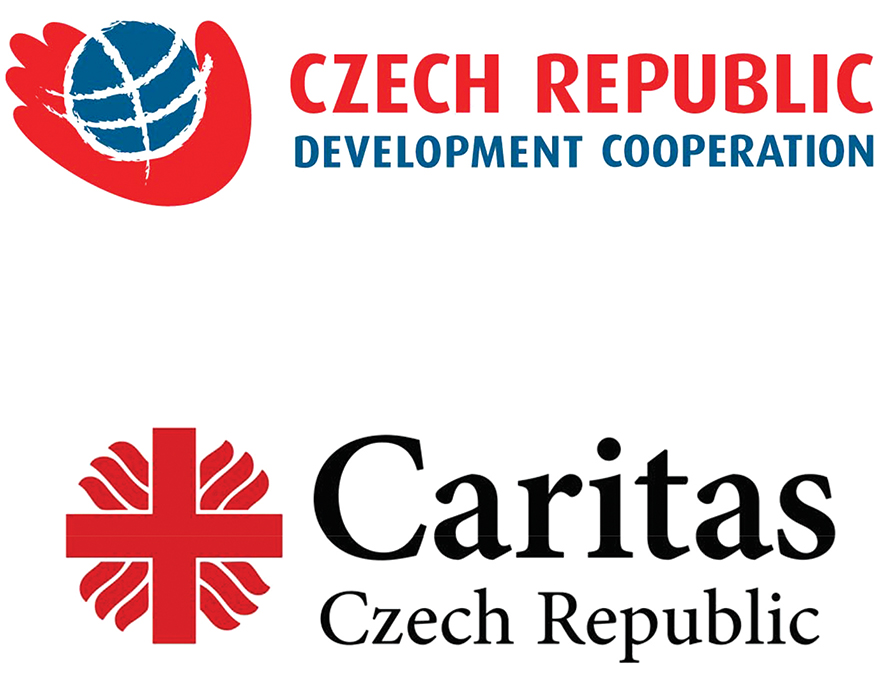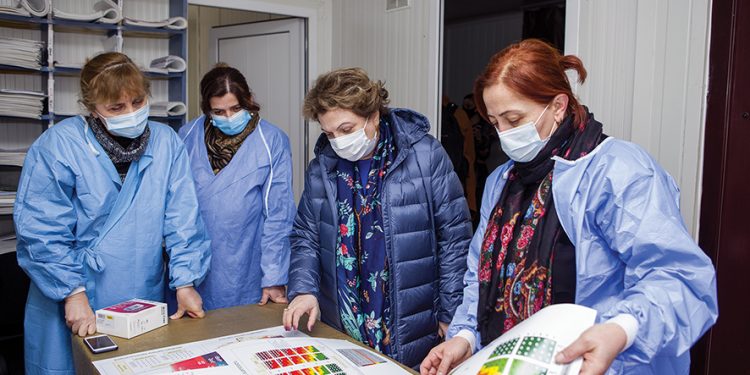For Caritas Czech Republic, the year 2023 has turned out to be particularly important. At the end of the year, along with other essential activities, we summarized the results of the four-year initiative to strengthen primary healthcare in Georgia. As a result of the project, the country now has updated clinical protocols and guidelines, qualified family doctors, and IT solutions supporting family doctors working throughout Georgia.
Why primary healthcare
Primary healthcare is the most important sector of the healthcare system, through which it is possible to prevent diseases, promote public health, and manage acute health problems and chronic illnesses that cause premature mortality.
Caritas Czech Republic has been improving the quality of primary healthcare services in Georgia since 2017, when the Czech and Georgian governments agreed to cooperate to work on primary healthcare reform together.
Considering the mentioned cooperation, within the framework of a four-year initiative carried out with the support of the Czech Development Agency, Caritas Czech Republic and the Ministry of Health of Georgia cooperated in the following areas: improving the quality of primary healthcare services through the development of primary healthcare quality management tools, creating centralized IT systems for primary healthcare management, and updated qualification standards and requirements for primary healthcare personnel.
“The project included such important activities as the establishment of an electronic information system for primary healthcare, as well as relevant training courses, which allowed family doctors throughout the country to be equipped with relevant skills. Both directions are essential because, as you know, primary healthcare reform is underway in the country, and the activities mentioned above laid a foundation for the correct progress of this reform. I hope the project will continue and include not only the pilot municipalities but also all the regions of Georgia and will lay the foundation for significant success for primary healthcare reform in Georgia.” – Gvantsa Gasviani, Head of the Department of Ministry of Internally Displaced Persons from the Occupied Territories, Labour, Leath and Social Affairs of Georgia
At the end of 2023, Caritas Czech Republic and the Ministry of Health of Georgia summarized the results of the mentioned project, about which we will tell you more in our article below.
Updated clinical protocols and guidelines
To correctly manage common diseases in primary healthcare, the latest, evidence-based clinical protocols and guidelines must guide family physicians. Within the framework of the project, Caritas Czech Republic retrained family doctors in Dusheti and Zugdidi municipalities according to updated clinical protocols. They have also provided supportive supervision to fully implement clinical protocols in practice.
As a result, the clinical competences of the medical staff of rural ambulatories and the quality of production of medical documentation improved, the patient registration system was adjusted, medical personnel started to use electronic medical records in a test mode, and the involvement of nurses in the management and prevention of common problems in primary healthcare improved.
Goderdzi Todua has worked as a family doctor in the rural ambulatory of Narazeni village of Zugdidi municipality since 2001. He and his colleagues serve a total of 3,400 patients – children, adolescents and adults:
“Through the training sessions of Caritas Czech Republic, my colleagues and I could devote more time to medical education, get acquainted with the latest information, and improve our qualifications. This help was vital and timely, and I am glad I had the opportunity to be involved in it.”
Nato Shengelia, Caritas Czech Republic’s project expert says that the project will play an essential role in strengthening primary healthcare, which is especially relevant in the context of the future planned primary healthcare reform in the country:
“The activities carried out within the framework of the project will contribute to expanding the professional competencies of family doctors and nurses to provide comprehensive services, improve teamwork, correctly assess the patient’s condition, and, if necessary, organize a referral. We are glad that during the project, we had the opportunity to interact with medical professionals in urban and rural ambulatories who are motivated to provide high-quality medical care, and we contributed to their knowledge and skills.”
Information systems for primary healthcare
The activities carried out within the framework of the project included the creation and implementation of several centralized electronic systems, the most important of which were the COVID-19 laboratory system (CovidLab) and the two-way integration engines necessary for the exchange of information between medical institutions and laboratories involved in the process of the CovidLab.
The project also created an electronic system for unified queuing, telemedicine, and referral in the healthcare sector – www.booking.moh.gov.ge, which Georgia’s population used to make advanced online reservations for vaccination against COVID-19. In addition, using the information systems created within the project and their integration with the state electronic systems made it possible to manage the entire process of laboratory samples and vaccination during the COVID-19 pandemic.
The project also worked on creating and testing a unified medical health record system in the primary healthcare sector, which made it possible to collect medical information and use it with the patient’s consent by different doctors for correct diagnosis and treatment planning.
Creating a management information system for primary healthcare facilities and digitising medical records was another vital direction of the project funded by the Czech Development Agency. The electronic system already serves several medical institutions in real-time mode.
It was also piloted in several municipalities, after which the main task was to use it throughout the country and further develop it.
It should be noted that in close cooperation with the Ministry of Health of Georgia, our experts also worked on various legislative documents, the timely approval of which will lead to the complete removal of paper carriers from the health sector and the digitalisation of processes.
Aleksandre Turdziladze, Caritas Czech Republic project expert notes that the project covered 46 medical institutions, including 142 medical personnel employed in rural areas from Dusheti and Zugdidi municipalities:
“Ultimately, the whole country will benefit from the project, as the results of all components will be handed over to the Ministry of Health of Georgia.”
Ekaterine Meskhrikadze, head of Caritas Czech Republic’s Georgian Office, notes that carrying out such an important project for our country was a great honor for Caritas Czech Republic’s team:
Before the initiative’s implementation, the primary healthcare system needed more evidence-based tools and approaches to improve the quality of medical care. With the support of the Czech Republic, the quality of medical services will be ensured, which will be measured by standardized clinical tools and technological solutions introduced exclusively for Georgia.”
Caritas Czech Republic supports the health sector of Georgia
With the support of various donor organizations, Caritas Czech Republic supports the Government of Georgia in implementing healthcare and social protection reforms. Our activities in the healthcare field includes improving the quality of primary healthcare services, supporting the early detection and prevention of oncological diseases, ensuring the quality of maternal and child healthcare services, and developing and implementing IT solutions for managing the primary healthcare system.
This material was prepared as part of a project funded by the Official Development Assistance of the Czech Republic and implemented in partnership with the Czech Development Agency and Caritas Czech Republic.















